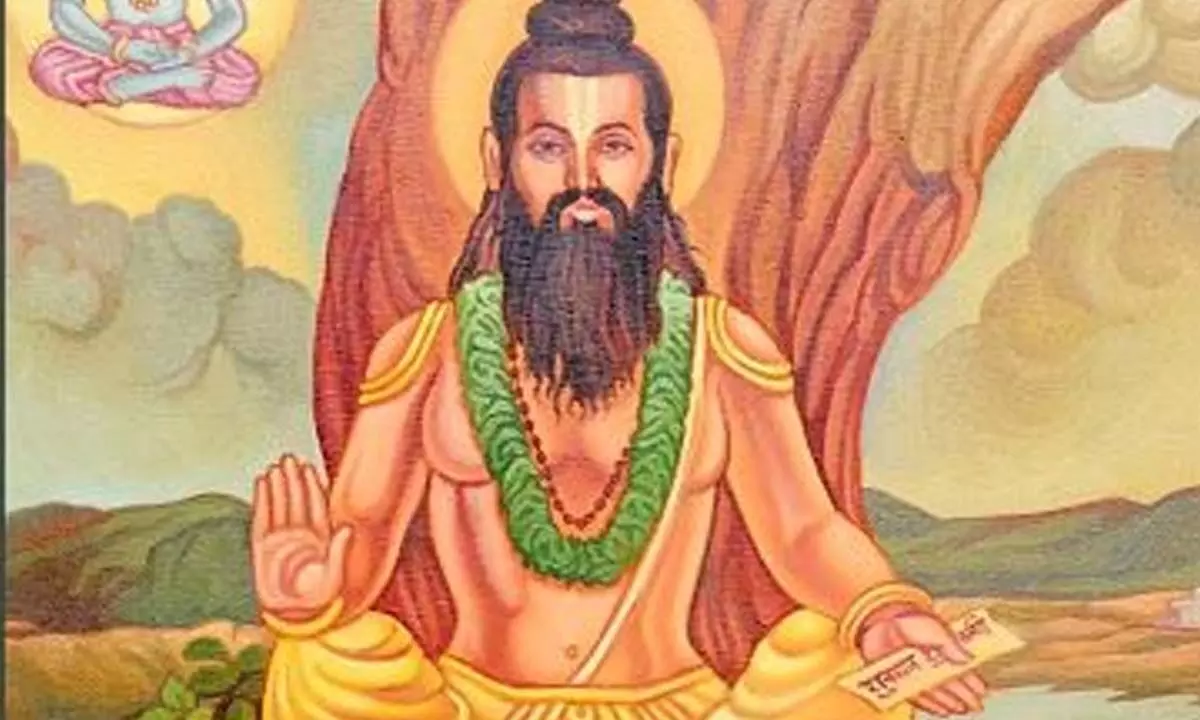Live
- Steps taken to ensure accommodation to common devotees says TTD EO J Syamala Rao
- CRDA invites tenders for ‘Happy Nest’ township
- PD Act invoked against red sanders smuggler
- Meghalaya scrape past Goa to secure QF berth
- India lift inaugural U19 Women’s Asia Cup
- No place for Stokes as Root returns to England’s squad for India ODIs and CT
- A year of political earthquake
- Penugonda stresses need for cultural renaissance
- IG inspects police stations at Chirala, Karamchedu
- Sandard Glass raises Rs40 cr in pre-IPO deal
Just In

Sage Yagnavalkya analyses the nature of human love. He starts with the love between a wife and a husband. Is the husband dear to the wife for his sake or for the happiness of her own self? Is the wife dear to the husband for her sake or for the happiness of his own self? This discussion is extended to several other bonds, son, and others, including to the abstract idea of money, and finally it transpires that a person loves several external things for the happiness of his own self
The recent Valentine’s Day showed some changing patterns of love in addition to the age-old boy-girl relationship. Some were seen celebrating with their pets and some were sending presents to themselves. Modern ideas of gender fluidity and freedom allowed the youth, particularly in the west, to disguise their loneliness and grief in a new expression of love for persons of the same gender, or for dogs. We derive happiness by loving some external object, a person, or an animal, as long as it gives full freedom.
Why are people dear to us? Do we really love them? A rather soul-searching discussion is seen in an Upanishad. Sage Yagnavalkya analyses the nature of human love. He starts with the love between a wife and a husband. Is the husband dear to the wife for his sake or for the happiness of her own self? Is the wife dear to the husband for her sake or for the happiness of his own self? This discussion is extended to several other bonds, son, and others, including to the abstract idea of money, and finally it transpires that a person loves several external things for the happiness of his own self. All things are dear to a limited extent for a limited time. The greatest lover loosens his hug when he is enjoying his deep sleep and so does the greediest person who may hug bundles of dollars. Even with God, our equation is the same. God is dear to us because we believe that he/she gives boons.
Sustained love involves an element of surrender to each other. The best examples are given in the symbolism of our deities, who are in fact two in one. At the human level, this surrender involves surrender of distrust. But the human being is becoming increasingly incapable of this quality called surrender. The idea of individualism has filled his/her ego. Philosophers, however, do not allow us to be happy at this level but point out that this pleasure is fleeting in nature and is also associated with pain at a later time when the object is lost, or when found obsolete, or found useless. The human being too, moves from object to object, from one date to another date to find happiness.
The philosopher’s question is about what this self really is. Apparently, for all of us, it is our body-mind complex. Happiness is called sukham in Sanskrit, in which kham means the sense organ. Hence, sukham is that which pleases the sense organ. The opposite is duhkham, which gives unhappiness to the sense organ. Different things are dear because they give happiness to different sense organs. There are certain other things which please the ego (a layer of mind), which are also pursued or loved by the person.
Vedanta analyses further and tells that the senses and the mind are nothing but transformations of the five gross elements – earth, water, fire, air, and space. The one reality pervading the universe is appearing as both the external objects and the organisms – as the eater and the eaten. This awareness leads to a further awareness that the same intelligence, or consciousness is the real self in all beings. Thus, the idea of self, which was limited to the body-mind complex, gets extended to all beings in the universe. If this idea is digested and lived, real unconditional love will start flowing for all beings, says Yagnavalkya.
In the times of Yagnavalkya, the hold of dharma on a human being was great and a person was bound by several social bonds associated with dharma. It was difficult to unshackle oneself from such bonds. But now, as human beings are getting increasingly isolated, it appears to be the time for Vedanta, because a workable answer for human happiness can be found only by analysing the real nature of self. It can also teach a person the virtue of surrender.
(The writer is a former DGP, Andhra Pradesh)

© 2024 Hyderabad Media House Limited/The Hans India. All rights reserved. Powered by hocalwire.com







